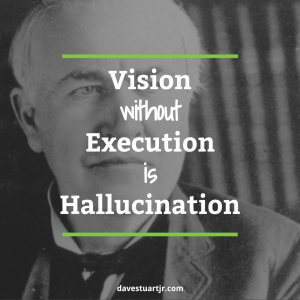 When my students asked me for my words of wisdom earlier this month, I gave them a line from Thomas Edison: “Vision without execution is hallucination.”
When my students asked me for my words of wisdom earlier this month, I gave them a line from Thomas Edison: “Vision without execution is hallucination.”
The vision part tends to be easy, for both my students and me. The execution part is harder; it's also where the magic happens.
Vision is easier than execution: two examples from my life
We want to represent success to our students, as my friend Luke Wilcox from East Kentwood puts it. How hollow would it be if I shared words of wisdom (or any kind of life instruction) that wasn't rooted in demonstrable effort in my own life? Modeling works for many kinds of academic instruction; it also works in those moments when we're trying to teach success.
Here are some places where I see the tension between vision and execution in my own life.
1. A rightly ordered life
- Vision: Being a great husband, dad, and teacher — in that order — who properly prioritizes his time and efforts so as to leave a legacy worth remembering.
- Execution: Saying no to good ideas. Placing limits on working hours (and wrestling, failing, wrestling daily to maintain those boundaries). Bringing home my best energy after a long day. Not bringing work home (writes the man who brought essays home twice last week).
See what I mean about the vision part being easy? Many folks want a rightly ordered life. But the execution part — actually doing the things that lead to the vision — that's hard. It's awesome picturing 100 years from now when Dave's Great Grandkids remember their great grandpa's story glowingly; it's painful saying no to good ideas or being efficient enough at work to avoid bringing work home. (As we all know, that last one seems like a never-ending battle.)
2. Writing for impact
- Vision: Writing for an audience of great educators from around the world so that they can stay encouraged, keep improving, and positively impact students.
- Execution: Consistently writing blog posts. Consistently publishing blog posts (especially when I don't like them). And consistently not getting distracted by non-writing stuff (e.g., obsessing over social media, worrying about blog design, freaking out about traffic statistics). This one also entails doing the other kinds of projects that keep me growing — speaking, writing books, creating online PD. But not letting these projects distract from consistent writing!
Again — how many people have had the experience where they think, “Dude, I could have written that book!” or, “I could have given a better speech than that!” Envisioning such things is nearly unconscious. But executing on such visions is — I promise — not at all exciting. It's sitting by yourself with a computer, pulling your hair, trying to figure out how to say what you mean, trying to silence the doubting voices. It's being awake at midnight on the phone with Bluehost customer support because your website is down or a plug-in is freaking out. It's a lot of lame, unsexy stuff — but without this stuff the vision doesn't have a chance.
Bringing it home for students
I ask my students this question every year:
By show of hands, who knows at least one adult who seems to genuinely dislike a significant chunk of their life, like their job or their marriage or their living situation, etc.?
Routinely, 80-90% of my students raise their hands. To which I respond:
Here's what I want you to think about, class. Of those adults you're picturing, how many of them do you believe sat in their ninth grade history class hoping that, one day, they'd dislike their life?
The answer, of course, is none. Nobody, as a ninth grader, aspires to live a frustrating life. They envision dirt bikes or white doctors' coats or book signings or exotic travel — and if not things this specific then feelings like peace, contentment, excitement, engagement, creativity. And while some of their aspirations may not be realistic, all of them deserve some time to think through what it might mean to turn vision into execution in their own lives.[hr]
Thank you to Shawn Veitch for leading with quotes.
Leave a Reply